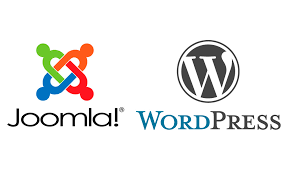Understanding the Difference Between WordPress and Joomla: Pros and Cons
 In the ever-evolving world of website development and content management systems, two platforms stand out as popular choices among website owners and developers: WordPress and Joomla. Both platforms offer unique features and capabilities that cater to different needs. In this comprehensive article, we will delve into the pros and cons of each platform, providing you with valuable insights to make an informed decision for your website. So, let’s dive in!
In the ever-evolving world of website development and content management systems, two platforms stand out as popular choices among website owners and developers: WordPress and Joomla. Both platforms offer unique features and capabilities that cater to different needs. In this comprehensive article, we will delve into the pros and cons of each platform, providing you with valuable insights to make an informed decision for your website. So, let’s dive in!
WordPress: Empowering Simplicity and Versatility
WordPress is renowned for its user-friendly interface and extensive plugin ecosystem. Its simplicity makes it an ideal choice for beginners and non-technical users. With its intuitive dashboard and easy-to-use tools, anyone can quickly create a stunning website without any coding knowledge.
Pros of WordPress
- User-Friendly Interface: WordPress boasts a highly intuitive interface, making it accessible to users of all skill levels.
- Vast Plugin Library: The extensive collection of plugins empowers users to add various functionalities to their websites effortlessly.
- Flexible Design Options: WordPress offers a wide range of customizable themes and templates, enabling users to create visually appealing websites tailored to their brand.
- Search Engine Optimization (SEO) Friendly: WordPress provides excellent support for SEO, allowing users to optimize their website’s visibility on search engines.
- Active Community: The WordPress community is vast and supportive, ensuring that users can find help and resources whenever needed.
Cons of WordPress
- Security Concerns: Due to its popularity, WordPress can be a target for hackers. However, using reliable security plugins and regularly updating the platform can mitigate these risks effectively.
- Customization Limitations: Although WordPress offers great flexibility, advanced customizations may require some coding knowledge or the assistance of a developer.
- Maintenance Overhead: Users are responsible for updating plugins, themes, and the WordPress core to ensure optimal performance and security.
Joomla: Emphasizing Advanced Functionality and Customization
Joomla, on the other hand, is a powerful content management system that prioritizes advanced functionality and flexibility. It caters to users who require intricate website structures and intricate content management capabilities.
Pros of Joomla
- Robust Content Management: Joomla excels in handling complex content structures, making it suitable for websites with extensive data and multiple contributors.
- Multilingual Support: Built-in multilingual capabilities allow users to create websites in different languages effortlessly.
- Advanced User Management: Joomla offers a comprehensive user management system, allowing administrators to assign specific roles and permissions to different users.
- Scalability: Joomla’s architecture makes it highly scalable, enabling websites to grow and accommodate increased traffic and content over time.
- Powerful Extensions: Joomla’s extensive extension library provides users with access to a wide range of powerful tools and functionalities.
Cons of Joomla
- Steeper Learning Curve: Joomla has a slightly steeper learning curve compared to WordPress, making it more suitable for users with technical expertise or those willing to invest time in learning the system.
- Limited Plugin Selection: Although Joomla offers various extensions, the sheer quantity and variety are not as vast as the ones available for WordPress.
- Less Active Community: Joomla’s community is smaller than WordPress’, which means finding resources and assistance may be slightly more challenging.
Which Platform Is Right for You?
Deciding between WordPress and Joomla depends on your specific needs and goals. If you value simplicity, an extensive plugin library, and a large community for support, WordPress is an excellent choice. On the other hand, if you require advanced functionality, robust content management, and scalability, Joomla may be the better fit.
Ultimately, it’s essential to evaluate your website’s requirements, consider your technical proficiency, and determine which platform aligns better with your long-term goals. Remember, the success of your website is not solely determined by the platform you choose, but also by the quality of content, SEO efforts, and overall user experience you provide.




